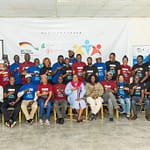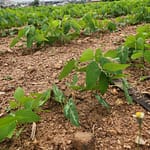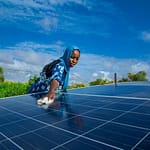The dinner session at the 30th Nigerian Economic Summit (NESG), held in collaboration with the Embassy of the Kingdom of the Netherlands, focused on the urgent need for renewable energy solutions to transform deprived communities in Nigeria. The session themed “Catalyzing Economic Transformation by Scaling Renewable Energy Solutions in Deprived Climes,” highlighted practical solutions to make renewable energy more accessible, affordable, and scalable, especially in Nigeria’s most deprived communities
This summit tackled a pressing issue for Nigeria: how to leverage renewable energy to drive economic transformation in underserved areas. The session brought together key players in Nigeria’s renewable energy space, aiming to create pathways for improving access to sustainable energy solutions in rural and urban settings.
Dr. Segun Adaju, CEO of Consistent Energy Limited and President of the Renewable Energy Association of Nigeria (REAN), in his opening speech acknowledged the advancements in Nigeria’s renewable energy sector. He emphasized the need for practical, scalable solutions and expressed optimism about the role that international partnerships, like the one between Nigeria and the Netherlands, can play in speeding up these developments. Adaju highlighted the potential of renewable energy to foster economic growth, particularly in off-grid areas that have long been ignored by traditional energy infrastructure.
One of the keynote speakers, Mrs. Olubukola Arowolo Verheijen, Special Adviser to the President on Energy, offered a critical perspective on the role of policy in scaling renewable energy. She acknowledged the country’s untapped potential, emphasizing that for Nigeria to fully harness its energy resources, the government must create robust, inclusive policies that prioritize both rural and urban energy access.
Verheijen noted that the Nigerian government cannot depend solely on the private sector to fill the energy gap, especially in deprived areas.
In her speech, Mrs Olubukola Verheijen outlined three essential pillars for expanding renewable energy stating that with “ financing, the right policies and legislation at federal and subnational levels, and new levels of partnership among stakeholders” Nigeria can significantly scale renewable energy solutions and provide equitable access to clean energy for all.
Verheijen emphasized that clear, transparent energy policies are not only necessary for development but critical for ensuring that the most vulnerable communities gain access to clean and reliable energy. “Nigeria’s future depends on energy solutions that leave no one behind,” she stated, reinforcing the government’s commitment to creating an enabling environment for energy sector growth.
At the panel session moderated by David Arinze, Program Officer Offgrid Energy, Diamond Development Initiatives, the conversation was centered around the financial and operational realities of renewable energy projects.
Abba Abubakar Aliyu, Managing Director of Rural Electrification Agency, shed light on innovative financing mechanisms that have been effective in attracting private-sector investments. He highlighted result-based financing models, which incentivize performance from developers before they receive financial backing. He cited a successful project implemented in a Nigerian university that utilized this model, allowing developers to take on the financial risk and deliver before receiving grants and subsidies. “This approach ensures accountability and keeps the focus on delivering results,” Aliyu explained.
He further stressed that renewable energy projects, particularly those in underserved regions, must remain financially viable, requiring collaboration with financiers and the government. Aliyu called for greater efforts in reducing bureaucratic hurdles and creating long-term strategies that would attract sustained investment into Nigeria’s renewable energy space.
Habiba Ali, CEO of Sosai Renewable Energies, emphasized the role of local entrepreneurs in expanding renewable energy access, particularly in underserved communities. Habiba pointed out that sustainable energy adoption can only be effective if local entrepreneurs are empowered to innovate and implement solutions. She stated that Local solutions, especially those driven by small businesses and entrepreneurs, have the power to create lasting change in rural communities and reduce the rate of insurgency in these communities. She also stressed the need for capacity building at the grassroots level, ensuring that rural populations, especially women, are trained to manage and maintain renewable energy systems.
Habiba acknowledged the challenges entrepreneurs face, particularly around financing and policy barriers, but advocated for simplified financing models that allow local businesses to access the resources they need to scale energy solutions effectively.
Susan Essien Deputy Country Director, Nigeria, SNV Netherlands Development Organization, provided valuable insights into ensuring solar energy is accessible to both rural and urban populations. Although many urban areas have easier access to solar marketplaces, she explained that the real challenge lies in making these solutions affordable and available to rural communities. She stressed the importance of reducing the information gap about renewables in rural communities and the gap in accessing renewable energy solutions.
Okey Esse, CEO of PowerStove Energy Limited, made significant contributions to the discussion by addressing common misconceptions about renewable energy, specifically the belief that it is limited to solar power. He clarified that renewable energy encompasses a variety of solutions, including clean cooking technologies
He shared how PowerStove tackled low purchasing power by creating a pay-as-you-cook mechanism, making energy more accessible. Additionally, to combat the rise in fuel and diesel costs, PowerStove integrated solar systems alongside their biomass cookstoves. He also highlighted their efforts to protect intellectual property and prevent refurbished models from diluting the market, ensuring the authenticity of their products.
Esse’s contribution emphasized the importance of affordable, scalable solutions that go beyond solar to include clean cooking technologies and flexible payment systems to make renewable energy accessible to more Nigerians.
As the event came to a close, one theme resonated across all discussions: collaboration. Speakers underscored the need for increased synergy between the public and private sectors, development partners, and international stakeholders. The consensus was clear: Nigeria’s renewable energy sector holds immense potential to drive economic transformation, especially in regions that have been underserved for far too long.
Participants agreed that the future of Nigeria’s renewable energy landscape lies in building trust, reducing risk for investors, and ensuring that rural and urban populations alike have access to clean energy solutions. As Mrs. Verheijen aptly summarized, “This is the season of solutions. We must move past age-old problems to achieve the Nigeria we envision.”
The dinner session at the 30th NESG summit underscored the critical role that renewable energy must play in shaping Nigeria’s future, particularly in underserved areas. By focusing on scalable, sustainable solutions, the summit highlighted how strategic partnerships, inclusive policies, and innovative financing models can collectively unlock the full potential of renewable energy to drive economic transformation.












